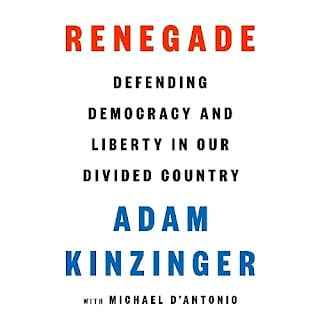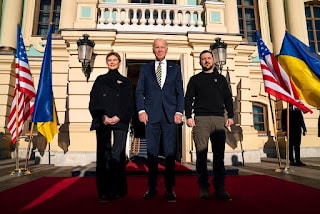Former Illinois Republican Congressman and former member of the January 6 Committee, Adam Kinzinger, writes the way he speaks, that is, he sounds like an ordinary, all-American guy. Of course, there is a difference between being just an ordinary, all-American guy and being a good-looking fighter pilot who gets elected to Congress and from there gets promoted to TV political pundit. That said, Renegade: Defending Democracy and Liberty in Our Divided Country, with Michael D’Antonio (Penguin Life, 2023) is an engaging account of how an otherwise ordinary seeming congressman catapulted himself to the center of one of our country’s most catastrophic political crises, with monumentally transforming consequences for him and more so for his Republican Party and for the present and future of American politics.
Given his background, Kinzinger understands « the resentments of those who feel they are dismissed as rubes from ‘flyover country’, » but who know themselves « to be decent, moral, intelligent, hardworking, and committed to our country. » In today’s political and media market, anyone who can somehow position himself as speaking from that world but not of it is guaranteed an audience. Kinzinger consciously harks back to what he himself labels « a Bygone Age, » before our current climate of affective political polarization.
He also writes as a survivor of the right-wing religious project, which produced him but which he (along with the likes of Russell Moore) aspires somehow to have transcended to something more authentic. His diagnosis of that sort of religiosity is scathing: « in my crowd the ones more likely to develop mental health or drug problems were the church schoolkids who never escaped the all-knowing eyes of the church » while similarly situated adults « become liars and hypocrites. » Kinzinger’s career overlapped with the decisive contemporary period in which « the language of the power-seeking political conservatives began to meld with the religiously conservative perspective to describe the opposition as dangerous, anti-American, anti-Christian, perverted, and ultimately evil. » He compares « the low-level anxiety that has always existed among very conservative Christians » with a « subterranean fire » (like the one in Centralia, PA), while « the preachers and politicians » have been the ones « who supplied the air that made it spread. »
Kinzinger also recounts his embrace of military life after 9/11 and offers insights into what may have been one of our country’s culturally defining post-9/11 mistakes. Referring to President Bush’s appeal to Americans to return to normal life, Kinzinger observes « it was a mistake. He gave a country willing to rally behind a cause no real chance to do so. » There is also the obvious observation that « Americans would have been better informed of the realities of the [Iraq] war if more people had had direct contact with those who served. » And so the war veteran ran for Congress. « I did believe that my experience in the military, in local government, and as a citizen of heartland America offered me th kind of perspective that might help. I was also, quite frankly, possessed of an ego sufficient to believe that I should be involved. »
That latter point, perhaps less characteristic of the typical self-promoting political book, disarms the reader in advance and readies the reader to recognize and accept Kinzinger’s cooperation, material and formal, with the destructive policies of his party almost until the end. This, of course, is the occupational hazard of being Republican convert to Never Trumpism. One must still account for and either defend or repent of one’s previous political allegiances. Hence it is somewhat refreshing the read his admission that « fame is the addictive drug of politics, » and that « the more you get it, the more you want it. » He scathingly describes his « nut tree » colleagues and the emotional atmosphere of a Congress « about as alcohol soaked as a college fraternity, » populated with « awkward but also envious people who inevitably revert to type, becoming desperate to be liked. »
His own desire to be at least re-elected was why he stayed with the party position and voted against Trump’s first impeachment. The case for impeachment he considers to have been compelling, « but supporting it would have required an act of rebellion that I wasn’t ready to make. » (His colleague Liz Cheney also voted as he did.)
Then came the election and election denialism. « When they learned of what Trump planned, GOP creatures in Washington and in the states joined the cause with the enthusiasm of a bunch of his schoolers who thought they had figured out how to hack a teacher’s computer to get the answers to the final exam. » Leader McCarthy he characterizes as « much more like an attention seeking high school senior. » I suspect that Kinzinger’s regular references to high school serve to reinforce his ordinary, all-American guy personal, for what is stereotypically more defining of ordinary, all-American guy experience than high school?
Kinzinger’s account of January 6 and its aftermath – even the part about him bringing his gun to his office the morning – is familiar. The next day, he « became the first Republican to call for Trump’s removal from office » asking Congress t invoke the 25th amendment. Eventually he became one of only 10 Republicans to vote to impeach the outgoing president. Such behavior earned him the anger of his constituents and events family. One relative wrote him that he had gone « against your Christian principles » and. joined « the devil’s army. » Eventually, he would decide not to run again in his party’s primary.
Meanwhile, however, Speaker Pelosi invite him and Liz Cheney to serve on the January 6 Committee. His service on that body is probably what most people know about him. He divides the witnesses into « Trump-infected zombies, » who were « pathologically loyal and incapable of independent thought » (e.g., Roger Stone, John Eastman), « partial zombies » (e.g., Rudy Giuliani) and « truth-tellers » (e.g., Cassidy Hutchinson).
Apart from familial and personal information, there is not much new in this account as such. What it provides is helpful insight into how ordinary, right-wing religious America became something so very different and so very dangerous.





